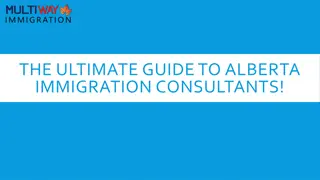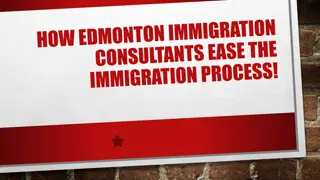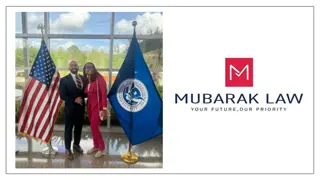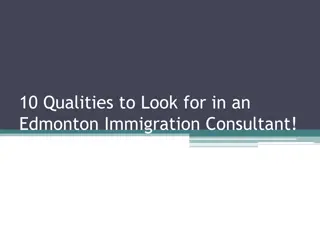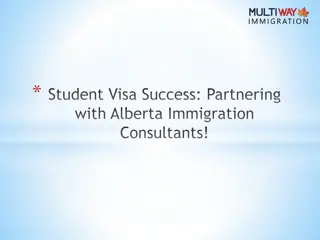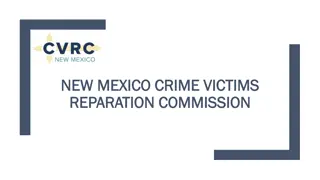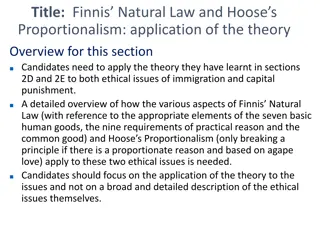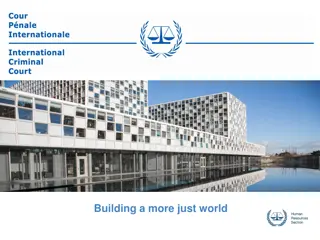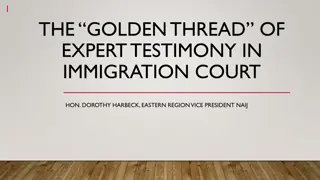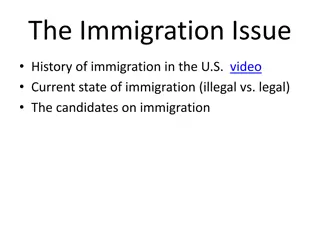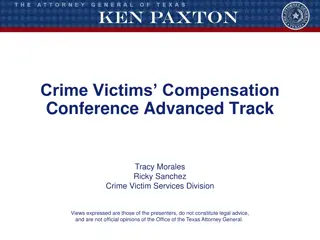Immigration Relief Options for Victims of Crimes Presented by Neil Rambana & Elizabeth Ricci
Immigration relief options, including CP, T visas, and U visas, are critical tools to protect victims of crimes such as human trafficking in the US. Continued Presence, USCIS assistance, and certifications play a key role in helping victims seek justice and support law enforcement efforts.
Download Presentation

Please find below an Image/Link to download the presentation.
The content on the website is provided AS IS for your information and personal use only. It may not be sold, licensed, or shared on other websites without obtaining consent from the author.If you encounter any issues during the download, it is possible that the publisher has removed the file from their server.
You are allowed to download the files provided on this website for personal or commercial use, subject to the condition that they are used lawfully. All files are the property of their respective owners.
The content on the website is provided AS IS for your information and personal use only. It may not be sold, licensed, or shared on other websites without obtaining consent from the author.
E N D
Presentation Transcript
Immigration Options for Victims of Crimes P R E S E N T E D B Y N E I L R A M B A N A & E L I Z A B E T H R I C C I R A M B A N A & R I C C I , P L L C T A L L A H A S S E E B A S E D O N T H E B L U E C A M P A I G N
Todays Topics CP T Visas U Visas VAWA Ethics Resources Q&A
Immigration Relief: A Critical Tool for Law Enforcement Continued Presence and Immigration Relief are tools that you can use to help eliminate human trafficking and fight crime in local communities. Victims may qualify for CP or immigration relief, often with help from law enforcement at the federal, state, local, or tribal level, as well as judges.
USCIS helps protect victims of human trafficking and other crimes by providing immigration relief. Individuals and their families may also fall victim to many other types of crime in the United States. DHS provides three types of immigration relief in order to encourage victims to come forward and work with law enforcement: Continued Presence (CP), T Visas and U Visas.
Continued Presence CP is a form of short-term immigration relief that allows a potential witness to remain in the U.S. during an investigation. CP should be made available as soon as law enforcement identifies a victim. The investigation does not have to be complete prior to requesting CP, which is requested by law enforcement only.
U Certifications & T Declarations You (judges, law enforcement, prosecutors) play a role in telling USCIS how the victim has assisted you.
T Nonimmigrant Status (T Visa) Provides immigration protection to victims of trafficking. The T Visa allows victims to remain in the United States and assist law enforcement authorities in the investigation or prosecution of human trafficking cases. Requires the victim to assist or cooperate with you in an investigation or prosecution (except where the victim is under 18 years of age or suffers severe trauma). Video
Trafficking Indicators Does the person appear disconnected from family, friends, community organizations, or houses of worship? Has a child stopped attending school? Has the person had a sudden or dramatic change in behavior? Is a juvenile engaged in commercial sex acts? Is the person disoriented or confused, or showing signs of mental or physical abuse? Does the person have bruises in various stages of healing? Is the person fearful, timid, or submissive? Does the person show signs of having been denied food, water, sleep, or medical care? Is the person often in the company of someone to whom he or she defers? Or someone who seems to be in control of the situation, e.g., where they go or who they talk to? Does the person appear to be coached on what to say? Is the person living in unsuitable conditions? Does the person lack personal possessions and appear not to have a stable living situation? Does the person have freedom of movement? Can the person freely leave where they live? Are there unreasonable security measures?
Victim-Centered Approach Immediately connecting the victim to a victim specialist who can connect them to support services emphasizing that assistance is available regardless of the outcome of the investigation and prosecution; Taking time to explain who they are, answer questions they might have, and acknowledge and address their fears; Being sensitive to cultural differences and language barriers and using an interpreter when needed; Conducting interviews in a neutral location, only after the victim s needs have been assessed and any urgent needs have been met; and Being patient and giving the victim time to stabilize and begin their recovery process.
Severe Forms of Trafficking in Persons Defined as the recruitment, harboring, transportation, provision, or obtaining of a person for labor or services, through the use of force, fraud, or coercion for the purposes of subjection to involuntary servitude, peonage, debt bondage, or slavery or sex trafficking in which a commercial sex act is induced by force, fraud, or coercion, or in which the person induced to perform such act has not attained 18 years of age.
Florida Law KIDNAPPING; FALSE IMPRISONMENT; LURING OR ENTICING A CHILD; CUSTODY OFFENSES 787.06
Available at USCIS.gov Provide victim and agency information, statement of claim, cooperation of victim, law enforcement attestation Who can sign?
U Nonimmigrant Status (U Visa) Protection to crime victims who suffered substantial mental or physical abuse as a result of the crime. Requires the victim to assist or cooperate with you in an investigation or prosecution.
Available at USCIS.gov Provide victim, agency and family information, criminal acts, helpfulness of victim, certification
U Visa Crimes Abduction, abusive sexual contact, blackmail, domestic violence, extortion, false imprisonment, felonious assault, (attempt), FGM, hostage, incest, involuntary servitude, kidnapping, manslaughter, murder, (conspiracy), obstruction, peonage, perjury, prostitution, rape, sexual assault or exploitation, (solicitation), slave trade, torture, trafficking, unlawful criminal restraint, witness tampering, (related crimes), other, (expansion)
U Certification This certification is required evidence for the U visa, and USCIS cannot process the victim s case without it. Certifying agencies can sign the certification.
Important! You always have discretion to complete a declaration or certification. You are under no legal obligation to complete the declaration or certification. You can provide the declaration or certification even if there is no arrest, no charges filed, no formal investigation, no prosecution, no conviction, or even if the case is closed. There is no federal statute of limitations on when a crime occurred and when a victim may be eligible for these immigration benefits. You can provide the declaration or certification for past, present or future work. Only USCIS has the authority to grant or deny a person s T or U visa application.
Withdrawal The victim is required to continue to support the investigation or prosecution as long as it is reasonable. Send your withdrawal to: U.S. Citizenship and Immigration Services Vermont Service Center ATTN: T/U-Visa Unit 75 Lower Welden St. St. Albans, VT 05479-0001 Or email: LawEnforcement_UTVAWA.vsc@uscis.dhs.gov
VAWA victims must establish Have or had a qualifying relationship with the abuser spouse, or, are the parent or child of the abuser Reside or resided with the abuser Have good moral character, and Have been victims of battery or extreme cruelty.
VAWA INA 101(a)(51) Self-petitions Proof Denials
Ethical Issues Confidentiality of petition vital Ensure communication not sent to trafficker, abuser
Resources for Law Enforcement http://www.dhs.gov/blue-campaign LexisNexis Expert Commentaries Winning U Visas: Getting the Law Enforcement Certification By Gail Pendleton http://niwaplibrary.wcl.american.edu/reference/ad ditional-materials/materials-for-adjudicators-and- judges/tools-for-courts www.ilrc.org/files/documents/u_visa_basics_for_la w_enforcement.pdf http://www.sogpubs.unc.edu/electronicversions/pdf s/ilb02.pdf
FSU Center for the Advancement of Human Rights http://www.cahr.fsu.e
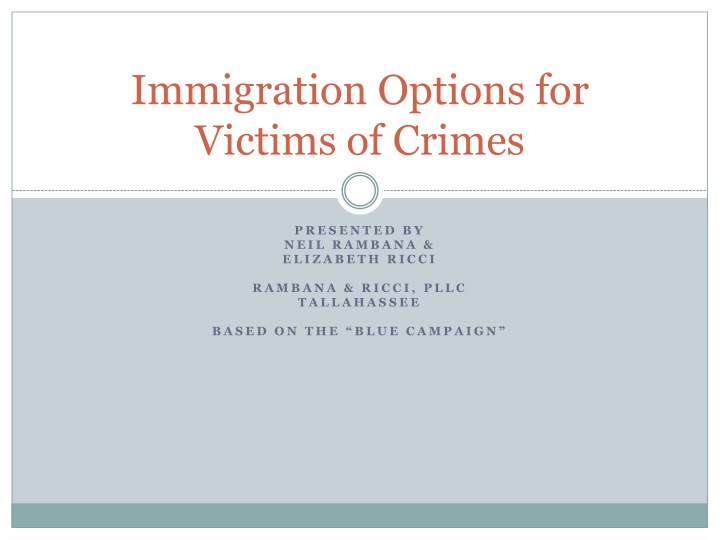




![Prevention and Combating of Hate Crimes and Hate Speech Bill [B.9B.2018]](/thumb/60513/prevention-and-combating-of-hate-crimes-and-hate-speech-bill-b-9b-2018.jpg)

